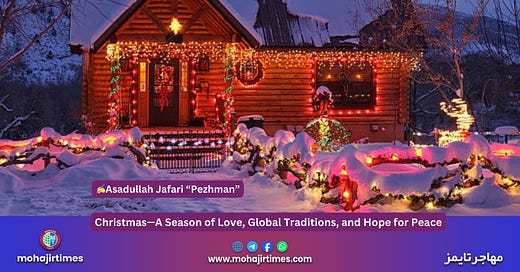Christmas—A Season of Love, Global Traditions, and Hope for Peace
In Afghanistan, similarly, Christmas is not widely celebrated due to the predominance of Islam. However, the small Christian community in the country observes the day with religious services
Foreword
Congratulations to all followers of Jesus Christ on this occasion! Christmas 2025, celebrated on December 25th, is a testament to the global unity in celebrating one of the most widely observed holidays. Originally a Christian celebration of the birth of Jesus, Christmas has evolved into a worldwide event, celebrated in many different cultures with diverse traditions and customs.
This essay explores the history of Christmas and its celebration across cultures, including countries in the East like Iran and Afghanistan. It examines the differences between Christmas and New Year’s Eve. Additionally, the seasonal context of the holiday and its global significance are considered.
History of Christmas
Christmas has its roots in the birth of Jesus Christ over 2,000 years ago, an event Christians commemorate on December 25th. This date was chosen in the 4th century AD when the church aligned Jesus’ birth with the Roman pagan festival of Sol Invictus, which celebrated the winter solstice (Nissenbaum, 1997). The early Christians blended their religious observances with popular customs of feasting, gift-giving, and merrymaking, which were widespread in pagan festivals.
Over the centuries, Christmas grew from a religious observance into a global cultural event, with new traditions like decorating Christmas trees, sending cards, and exchanging gifts. Today, Christmas is a religious and secular celebration embraced by Christians and non-Christians (Kelly, 2010).
Date of Celebration
Christmas is celebrated on December 25th each year, a date rich in both religious and cultural significance. For Christians, it marks the birth of Jesus Christ, a pivotal event in their faith. The choice of this date was not arbitrary but a deliberate alignment with the Roman pagan festival of Sol Invictus, which celebrated the winter solstice. This alignment was a strategic move by the early church to co-opt the existing pagan celebrations and provide a Christian alternative. For many others, Christmas serves as an opportunity to reflect on goodwill, peace, and charity themes. In some Christian traditions, such as those in Eastern Orthodox churches, Christmas is celebrated on January 7th due to differences in the Julian and Gregorian calendars (Tucker, 2011).
Christmas in Different Cultures and Countries
Christmas is celebrated uniquely worldwide, with each country and culture bringing its own unique and intriguing flavor to the holiday. The diversity of traditions adds a layer of fascination to this global celebration.
USA and Canada: Christmas in Canada and North America is marked by festive decorations, Christmas trees, and Santa Claus parades. People gather for family meals, exchange gifts, and participate in community events. Christmas Eve is often a time for church services, while Christmas Day is for family celebrations (Kelly, 2010).
UK and Germany: In the UK, Christmas traditions include caroling, festive meals, and Christmas crackers. Boxing Day celebrated on December 26th, is a public holiday for shopping and socializing (Nissenbaum, 1997). So, Germany is famous for its Christmas markets, or “Christkindlmarkt,” where visitors can buy handcrafted ornaments and traditional foods. The Advent calendar is also widespread, counting down the days to Christmas with small surprises.
Mexico and Japan: Christmas celebrations in Mexico begin with Las Posadas, a reenactment of Mary and Joseph’s search for shelter. The celebrations continue with a late-night feast on Christmas Eve and fireworks on Christmas Day (Kelly, 2010). So, in Japan, Christmas is not a religious holiday but has become a festive occasion. People enjoy light displays, Christmas-themed events, and a unique tradition of eating fried chicken, popularized by a marketing campaign in the 1970s.
Ethiopia: In Ethiopia, Christmas is celebrated on January 7th according to the Eastern Orthodox calendar. It is marked by religious services, feasting, and family gatherings, with traditional foods like doro wat and a spicy chicken stew and so on (Kelly, 2010).
Afghanistan and Iran: In Iran, Christmas is not a public holiday, but the Christian community, particularly Armenian Christians, celebrates the day with church services and family gatherings. Though Christmas is not widely recognized in the broader society, many Eastern countries and citizens embrace the spirit of goodwill, charity, and peace during the season (Nissenbaum, 1997). In Afghanistan, similarly, Christmas is not widely celebrated due to the predominance of Islam. However, the small Christian community in the country observes the day with religious services. For expatriates and international organizations, Christmas is marked by private celebrations and charitable acts.
Difference Between Christmas and New Year’s Eve
While both Christmas and New Year’s Eve are celebrated around the same time, they differ in focus and traditions. Christmas centers around the birth of Jesus Christ, family gatherings, charity, and religious observance. It is a time of reflection, peace, and togetherness, focusing on love and goodwill (Nissenbaum, 1997). While New Year’s Eve focuses on transitioning from the old to the new year. It is celebrated with parties, fireworks, and countdowns to midnight. While it is also a time for reflection, New Year’s Eve focuses on renewal, new beginnings, and setting resolutions for the coming year.
Season of Christmas
Christmas occurs during the winter season in the Northern Hemisphere, a time associated with cold weather, snow, and winter activities. However, the season also brings a sense of warmth and comfort, with people enjoying hot beverages, cozy gatherings, and hearty meals. Christmas decorations, such as lights and ornaments, further enhance the festive mood, bringing comfort and joy to all. In the Southern Hemisphere, where Christmas falls during summer, the holiday is often marked by outdoor activities like barbecues and beach outings. Countries like Australia and South Africa celebrate Christmas with a focus on outdoor enjoyment and sunny weather (Kelly, 2010).
In Conclusion
Christmas 2025 will be another year of global celebration, filled with diverse traditions reflecting various countries’ rich cultural heritage. From its religious origins to its modern-day observances, Christmas inspires people worldwide with its messages of love, peace, and goodwill. As we embrace these values, may 2025 be a year of empathy, kindness, and unity across the globe. Let this season and the year ahead be filled with compassion, where love transcends borders and brings light to all. May this new year be one of peace and tranquility shared by all humanity.
A New Year Greetings
Congratulations on this joyous occasion! New Year greetings to all the loved ones worldwide, especially the followers of Jesus Christ. May 2025 be a year full of love, peace, and tranquility for all countries and people. Let the season’s spirit guide us toward a brighter future where kindness and understanding prevail, uniting everyone in harmony and goodwill. So, I Wishing everyone a prosperous and joyful year ahead!





